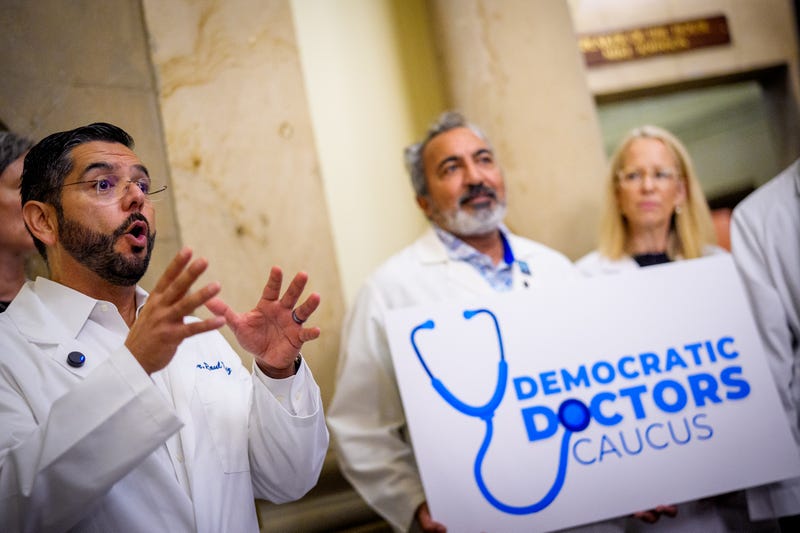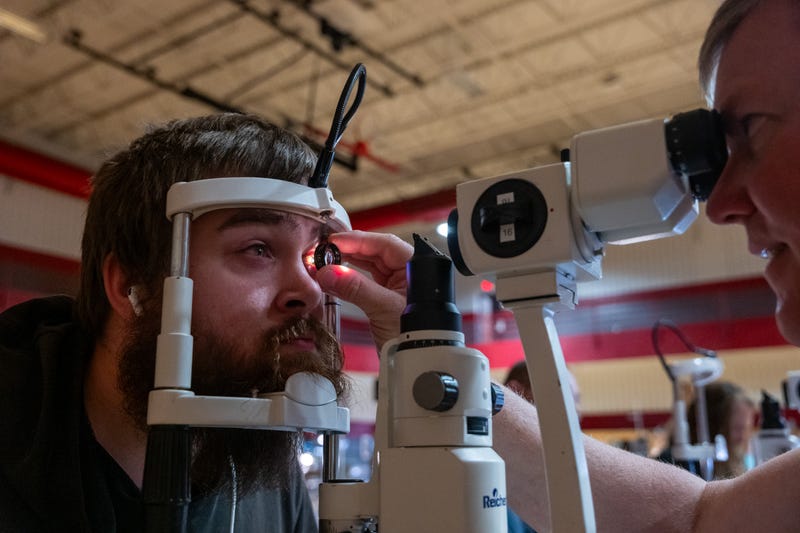
Thousands of Minnesotans and potentially millions of Americans who buy their health care insurance on their own are about to face big increases in premiums starting next year.
That's not good news to Cindy VanDerPol who owns Pastures of Plenty farms.
"It's a huge source of stress. And I know I'm not alone in this," said VanDerPol.
She is recovering from breast cancer, and she said the stress of her own health and running a farm is too much to bear.
VanDerPol joined Governor Walz and others at a round table discussion on the upcoming premium increases and reduced access to coverage.
Walz says rural communities and small businesses are expected to be affected the most, and without federal action, premium tax credits are set to expire.
There is bipartisan support in Congress for extending tax credits that have made health insurance more affordable for millions of people since the COVID-19 pandemic. But the credits are in danger of expiring as Republicans and Democrats clash over how to do it and as a looming government shutdown threatens even more programs.
Walz's warning about the rising costs come as President Donald Trump's H.R.1 bill, most commonly referred to as the "One Big Beautiful Bill," goes into effect. The cuts to health care is expected to raise health care costs for middle-class Minnesotans by an average of $2,000 per year.
The Governor was also joined by health care experts, lawmakers and others for a roundtable discussion on the impact of the cuts begin in January.
"We're going to see in Minnesota that this undermines the basic health and security of folks, but it undermines our economic growth because these costs are going to get passed on too," Walz added. "We're going to see employers start to experience this."
VanDerPol says they went through last year without insurance, and did their best to save up for medical costs.
"I still go every six months for checkups for my breast cancer, to pay my medications," she explains. "This year, it did work for us to buy insurance through the buy-in program. It costs about $1,400 a month for us. We're still praying that I don't get sick again because our plan has a $30,000 deductible."
Walz angrily blamed the Trump Administration and Congress for allowing the bill to threaten health care coverage, calling it a deliberate choice.
"You're not going to find anybody in the insurance industry say that this is going to reduce costs," Walz added. "You're not going to find any small farmers that are saying, 'you know what I really enjoy? My health care costs spiking or not being able to get health care.' Those people don't exist because this is real. This isn't some culture war thing that might not actually happen. This is going to happen. It is happening and it's absolutely unnecessary."
After the bill's passage in July, Minnesota Rep. and House Majority Whip Tom Emmer, a frequent critic of Walz, said people are just 'guessing' what the actual effects of it will be. He adds people should trust they'll be happy with the outcome.
"Within six to 12 months, as these trade deals come online and people start to see what this does for them personally and for the economy, I think a year from now they are going to be very happy about where the country is and where it's headed," Emmer explained.

Millions of Americans could face higher health insurance rates
Enrollment in ACA plans has surged to a record 24 million people in large part due to the billions of dollars in subsidies that have lowered costs for many people. The expanded subsidies allowed some lower income enrollees to access health plans with no premiums and capped the amount higher earners pay for premiums to 8.5% of their income. It also expanded eligibility for middle-class earners.
With expiration now just a few months away, some of those people have already gotten notices that their premiums — the monthly fee paid for insurance coverage — are poised to spike next year. Insurers have sent out notices in nearly every state, with some proposing premium increases of as much as 50 percent.
Lawmakers are facing pressure to act from some of the country’s biggest industries, including the insurers that cover people on the marketplace and hospital executives who say they’re already going to be squeezed by the Medicaid cuts in President Donald Trump’s “big, beautiful" tax bill.
“There’s broad awareness that there’s a real spike and premiums coming right around the corner, both Republicans and Democrats,” said David Merritt, senior vice president of external affairs at Blue Cross Blue Shield. “It’s certainly lining up for Congress to have an opportunity to head off this problem.”
Companies have said they’ll need to raise premiums without the subsidies because healthier and younger people are more likely to opt out of coverage when it gets more expensive, leaving insurers to cover older and sicker patients.
In Iowa last month, the state’s insurance commissioner weighed increases ranging from 3% to 37% against a stream of angry public comments. One woman who runs a garden center in Cedar Falls, Iowa, said she was considering dropping health insurance altogether.
“I am already living as frugally as I possibly can while working as hard as I possibly can, putting in as many hours as I am allowed to at my job, never missing a day of work,” the woman, LuAnn, wrote in a public comment published to the commissioner’s website.
Tug-of-war over Obamacare spending plays out on the Hill
On Capitol Hill, the issue has become entangled in a larger fight over government funding as a shutdown looms at the end of the month. Schumer and House Democratic Leader Hakeem Jeffries have said Democrats will not vote to keep the government open unless an extension of the health care tax credits is part of the deal. Republicans have said that they want more time to look at the subsidies and potentially scale them back. They will also have to wait for a signal from Trump, who has not yet weighed in.
Jeffries said this past week that “we will not support a partisan Republican spending bill that continues to rip away health care from the American people.”
Republican leaders are eyeing a potential stopgap bill that would keep the government open for a few weeks and are unlikely, for now, to include the extension. But GOP leaders in both the House and Senate are also under pressure from some members who worry that premium increases will be a political liability before the midterm elections.
Senate Majority Leader John Thune, R-S.D., has said he wants to see a proposal from Democrats on how to extend the subsidies since they are pushing the issue. “Maybe there is something we can do in the middle as a solution," he said in a Punchbowl News interview on Thursday, adding that his members are divided on the issue.
Still, Thune has ruled out quick action, even as he noted that premium notices will go out soon. He has said a short-term spending measure to fund the government for several weeks while Congress finishes its budget bills is not likely to include an extension of the benefits,
House Speaker Mike Johnson, R-La., has said that many of his members would oppose an extension, but has not ruled it out.
In recent days, 15 House Republicans in competitive political districts introduced legislation to extend the tax credits for one year. “While the enhanced premium tax credit created during the pandemic was meant to be temporary, we should not let it expire without a plan in place,” said Rep. Jen Kiggans, R-Va., who led the effort with Rep. Tom Suozzi, D-N.Y.
Middle-class and small business owners, like the ones who dot Kiggan's coastal Virginia district, will be especially vulnerable to big health insurance hikes if the subsidies are not extended.
Several Senate Republicans also said they'd favor an extension. Missouri Sen. Josh Hawley said that if Congress doesn't act, some premiums will "skyrocket, and not by a little bit. We’re looking at massive increases. People will not be able to afford it.”
Texas Sen. John Cornyn said he thinks Congress should scale back the subsidies for the highest income people who receive them. “I think we all know that access to health care is important and we take it very seriously,” he said.
Senate Finance Committee Chairman Mike Crapo, R-Idaho, who has jurisdiction over the tax credits, said he's working with his colleagues to figure out if there is a solution. “There are a lot of ideas being thrown out there," Crapo said. "I'm trying to find a solution, I'm not telling you what the solution is.”
Others were firmly against it. “It's costing us billions of dollars,” said Sen. Ron Johnson, R-Wis.
Open enrollment begins Nov. 1 and people will begin to see “real sticker shock,” as ACA plan prices are posted next month, said Sen. Tammy Baldwin, D-Wis.
“Timing is important,” Baldwin said.
The Associated Press contributed to this story.
